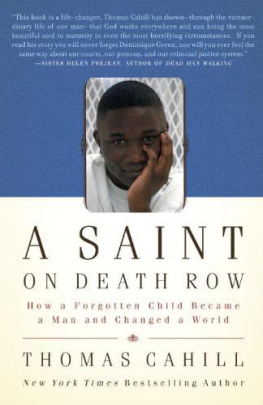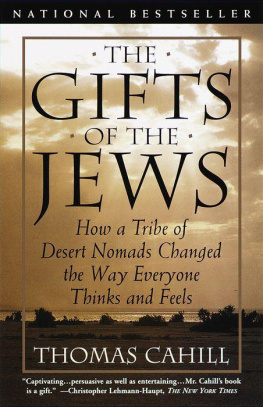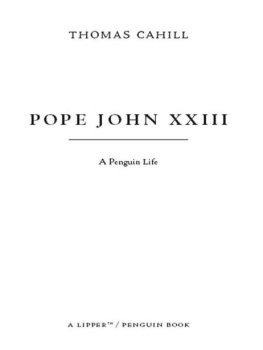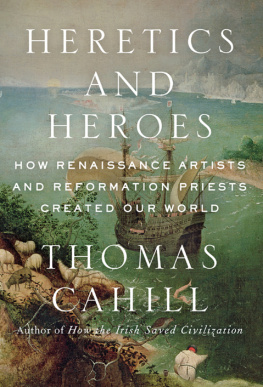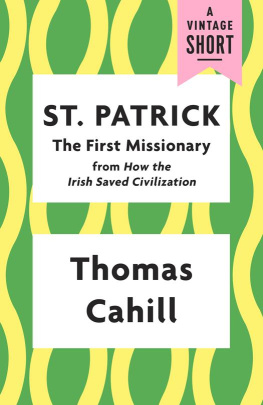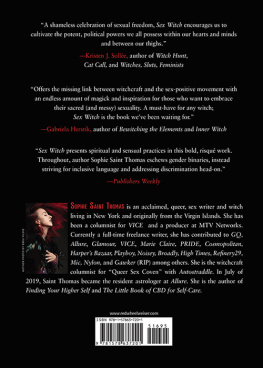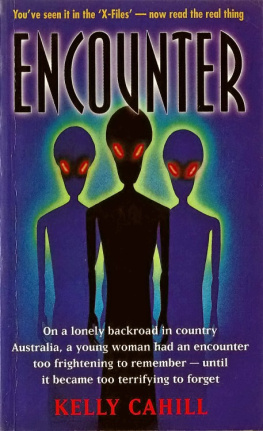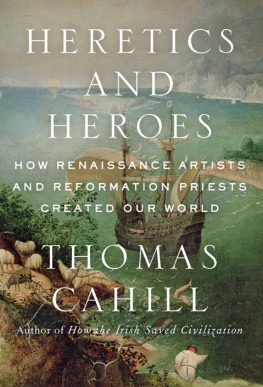Thomas Cahill - A Saint on Death Row: The Story of Dominique Green
Here you can read online Thomas Cahill - A Saint on Death Row: The Story of Dominique Green full text of the book (entire story) in english for free. Download pdf and epub, get meaning, cover and reviews about this ebook. year: 2009, publisher: Nan A. Talese, genre: Detective and thriller. Description of the work, (preface) as well as reviews are available. Best literature library LitArk.com created for fans of good reading and offers a wide selection of genres:
Romance novel
Science fiction
Adventure
Detective
Science
History
Home and family
Prose
Art
Politics
Computer
Non-fiction
Religion
Business
Children
Humor
Choose a favorite category and find really read worthwhile books. Enjoy immersion in the world of imagination, feel the emotions of the characters or learn something new for yourself, make an fascinating discovery.
- Book:A Saint on Death Row: The Story of Dominique Green
- Author:
- Publisher:Nan A. Talese
- Genre:
- Year:2009
- Rating:5 / 5
- Favourites:Add to favourites
- Your mark:
- 100
- 1
- 2
- 3
- 4
- 5
A Saint on Death Row: The Story of Dominique Green: summary, description and annotation
We offer to read an annotation, description, summary or preface (depends on what the author of the book "A Saint on Death Row: The Story of Dominique Green" wrote himself). If you haven't found the necessary information about the book — write in the comments, we will try to find it.
A Saint on Death Row: The Story of Dominique Green — read online for free the complete book (whole text) full work
Below is the text of the book, divided by pages. System saving the place of the last page read, allows you to conveniently read the book "A Saint on Death Row: The Story of Dominique Green" online for free, without having to search again every time where you left off. Put a bookmark, and you can go to the page where you finished reading at any time.
Font size:
Interval:
Bookmark:

I am grateful to many, many people who were helpful to me in the writing of this book, most especially to Sheila Murphy and Andrew Lofthouse, without whom I could not have written much of anything, but also to Jessica Tanksley and David Atwood, both of whose cooperation was invaluable in creating an accurate account. Besides Jessica and David, a number of Houstonians supplied me with important material and insights, among these Dominique's mother, Stephanie, his brothers, Hollingsworth and Marlonnow a sergeant in the U.S. Army, whom I interviewed in Anchorage prior to his second tour of duty in Iraqand Sylvia Gonzales. Mary C. Schneider, a sympathetic psychologist who interviewed Dominique extensively, was generous with her time and insights, as was Pat Lofthouse with copies of the videotaped interviews she had made of Dominique and of relevant figures in his case. Gerald Kelly offered me his gracious hospitality at Maryknoll House; and my wife Susan Cahill, Bennett Ashley, Lynn Franklin, Walter Long, Mario Marazziti, James Morris, Michael Smith, Donald Spoto, and Brigid Wolff all read early drafts of the manuscript and offered exceedingly useful criticism. I could not have managed without the marvelous assistance of Sarah C. Palmer, whose research abilities quite surpass my own. As with all my books, there stands behind this one a large cast of essential dramatis personae: Nan A. Talese (always in first place) and her staff, Doubleday's publisher Stephen Rubin, Kathy Trager, Emily Mahon, Jessie Bright, John Pitts, Nora Reichard, Trent Duffy, the incomparable Jennifer Marshall, and the members of the sales force, without whose enthusiasm no author can hope to reach his intended readers. Nor can I omit mention of my preternaturally astute literary agent Lynn Nesbit and her able colleagues.
I would also like to thank Ivan Cantu, Kenneth Foster Jr., Howard Guidry, and Son Tran for permission to reprint excerpts from their writings. Dominique J. Green, before his death, turned over to me copies of all his writings with a view to my using them as I wished to tell his story.
ALSO BY THOMAS CAHILL
THE HINGES OF HISTORY
How the Irish Saved Civilization
The Gifts of the Jews
Desire of the Everlasting Hills
Sailing the Wine-Dark Sea
Mysteries of the Middle Ages
A Literary Guide to Ireland (with Susan Cahill)
Jesus Little Instruction Book
Pope John XXIII
THOMAS CAHILL is the author of five volumes in the Hinges of History series: How the Irish Saved Civilization, The Gifts of the Jews, Desire of the Everlasting Hills, Sailing the Wine-Dark Sea, and Mysteries of the Middle Ages. They have been best-sellers, not only in the United States but also in countries ranging from Italy to Brazil. He and his wife, Susan, also a writer, divide their time between New York City and Rome.
DOMINIQUE GREEN

This summary of Dominique's case, written by Andrew Lofthouse in early 2004 at Sheila Murphy's request, was intended to serve as an information sheet to be distributed to the press and other interested parties. I include it here because it is an admirably terse summary of Dominique's story.
HOW RACISM AND A FLAWED LEGAL SYSTEM
CONSPIRE TO EXECUTE DOMINIQUE GREEN
Dominique Green is a 29-year-old African American who is nearing the end of his appeals on Texas Death Row. We believe that after a review of the facts of the case, you, like us, will see racism and a flawed legal system prevented justice from prevailing in Dominique's case.
Dominique Green was an unloved, African American young man, who was poor in spirit as well as material goods. His parents were alcoholics and his father was addicted to marijuana. His mother was mentally ill and repeatedly tortured and physically abused Dominique and his younger brothers, going so far as holding their hands over a flaming stove.
To save his fragile siblings, Dominique took their punishment. Once he took his brother to a homeless shelter where they lived to avoid the constant abuse at home. When Dominique, at age 15, and his younger brother Marlon were thrown out of their house by their mother, Dominique rented a storage shed for the two of them to live in and sold drugs to support Marlon and himself.
One evening in 1992, when Dominique was 18 years old, he allegedly went out with a group of three men whom he knew. They were said to have robbed people at gunpoint. One man, Andrew Lastrapes, was killed by a single shot to the chest.
There were no eyewitnesses or scientific evidence that indicated Dominique participated in this crime. The only evidence against him came from the other young men who all testified against Dominique. In return, the State dropped capital murder charges against them a few days before Dominique's trial. Dominique was also offered a deal in exchange for testimony about the other men, but Dominique refused, saying he was innocent.
Two of the other men, the black men, went to prison, while the white man who admitted being present at the murder and sharing the proceeds from the robberies was not indicted or prosecuted at all. Indeed, prosecutors encouraged him not to speak to anyone about the case, even though he was never charged. This all occurred in Houston, a part of Harris County, Texas, a place that has sent more inmates to their executions than 47 states and has thus gained the infamous title Death Penalty Capital of the World.
During the sentencing phase of the trialwhen the jury was determining whether Dominique should live or die his court-appointed lawyer chose psychologist Dr. Walter Quijano to testify in defense. To analyze Dominique's future dangerousness, Dr. Quijano took into account the fact that Dominique is African American. He did not, however, share this bias with the jury.
Recently, the Supreme Court overturned the death sentence of Victor Saldano after a former Texas attorney general, John Cornyn, admitted error in multiple cases in which prosecutors called Dr. Quijano, who had testified in a similar capacity as he had in Dominique's trial, saying Mr. Saldano was more likely to be violent because he was Hispanic.
Racism again infected this phase of Dominique's trial when the prosecution construed the words of a rap song to be his own. While Dominique was locked up awaiting trial, he wrote a letter to a friend. At the end of the letter he quoted a popular rap song with the words trigga happy nigga. Dominique, who was only 18 at the time, meant this as a tongue-in-cheek reference to how he thought the police saw him, not to any future plans.
The jury, which had no African Americans on it, was not informed the phrase was from a song. The prosecution argued Dominique should be executed because he is a trigger-happy nigger even though he had no prior convictions for violent crime and only one shot was fired after an apparent struggle where the victim pulled out a knife.
The defense also put Dominique's mother on the stand even though her doctor told them she suffers from psychological problems, including multiple personality disorder, and was not stable. The defense lawyer [in this case, Diana Olvera is meant], however, told the judge that she knew how to determine which personality was testifying. The mother then stated that Dominique should be executed.
Font size:
Interval:
Bookmark:
Similar books «A Saint on Death Row: The Story of Dominique Green»
Look at similar books to A Saint on Death Row: The Story of Dominique Green. We have selected literature similar in name and meaning in the hope of providing readers with more options to find new, interesting, not yet read works.
Discussion, reviews of the book A Saint on Death Row: The Story of Dominique Green and just readers' own opinions. Leave your comments, write what you think about the work, its meaning or the main characters. Specify what exactly you liked and what you didn't like, and why you think so.

